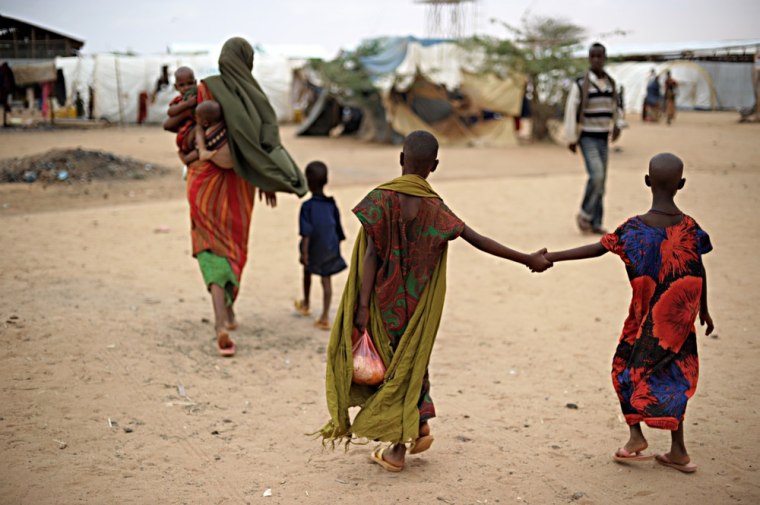The United Nations declared famine in two regions of southern Somalia Wednesday and said it could quickly spread unless donors took action.
Mark Bowden, humanitarian coordinator for Somalia, said southern Bakool and Lower Shabelle had been hit by the worst famine in the region for 20 years.
The U.N. is proposing "exceptional measures" of providing "cash relief" while it finds ways of getting larger volumes of food aid into southern Somalia, Bowden said. The U.N. is also appealing for $300 million over the next two months for Somalia.
"If we don't act now, famine will spread to all eight regions of southern Somalia within two months, due to poor harvests and infectious disease outbreaks," Bowden said.
"Every day of delay in assistance is literally a matter of life or death for children and their families in the famine-affected areas."
The U.N. said 3.7 million people across the war-ravaged Horn of Africa country, or almost half the population, were now in danger. Of them 2.8 million are in the south.
In the worst-affected areas, half the children are malnourished. "It is likely that tens of thousands will already have died, the majority of those being children," Bowden said.
Years of drought, that have also affected Kenya and Ethiopia, have hit harvests and conflict has made it extremely difficult for agencies to operate and access communities in the south of the country.
The south is controlled by al-Shabab Islamist insurgents, affiliated to al-Qaida, who are fighting to topple the Western-backed government. The group also controls parts of the capital Mogadishu and central Somalia.
In early July, the rebels lifted a ban on food aid which they had said created dependency. Some analysts say they are allowing aid in because they fear a public backlash if they do not. Others say the rebels want bribes.
The U.N. has said the inability of food agencies to work in the region since early 2010 because of the ban had contributed to the crisis.
"If cash is made available, that will enable the market to continue to function," said Luca Alinovi, head of the U.N.'s Food and Agriculture Organization in Somalia.

A change in US policy U.S. aid officials said Wednesday they would send help to the areas of Somalia under the control of al-Shabab, the BBC reported. But officials wanted assurance the aid wouldn't fall into the hands of the insurgents.
Al-Shabab is considered a terrorist group by the U.S. and last year the U.S. stopped sending aid to the areas of Somalia controlled by the group.
"What we need is assurances from the World Food Program and from other agencies, the United Nations or other agencies, both public and in the non-governmental sector, who are willing to go into Somalia who will tell us affirmatively that they are not being taxed by al-Shabab, they are not being subjected to bribes from al-Shabab, that they can operate unfettered," said Donald Steinberg, deputy administrator of the U.S. Agency for International Development, in an interview with the BBC.
The U.N. is working to improve its access to airstrips in al-Shabab-controlled territory so that it can import large volumes of food into the country, Bowden said.
Nearly 135,000 Somalis have fled since January, mainly to Kenya and Ethiopia. An average of 1,700 and 1,300 Somalis are arriving in Ethiopia and Kenya respectively each day.
The U.N. defines famine as at least 20 percent of households facing extreme food shortages, a crude mortality rate of more than 2 people per 10,000 per day and malnutrition rates of above 30 percent.